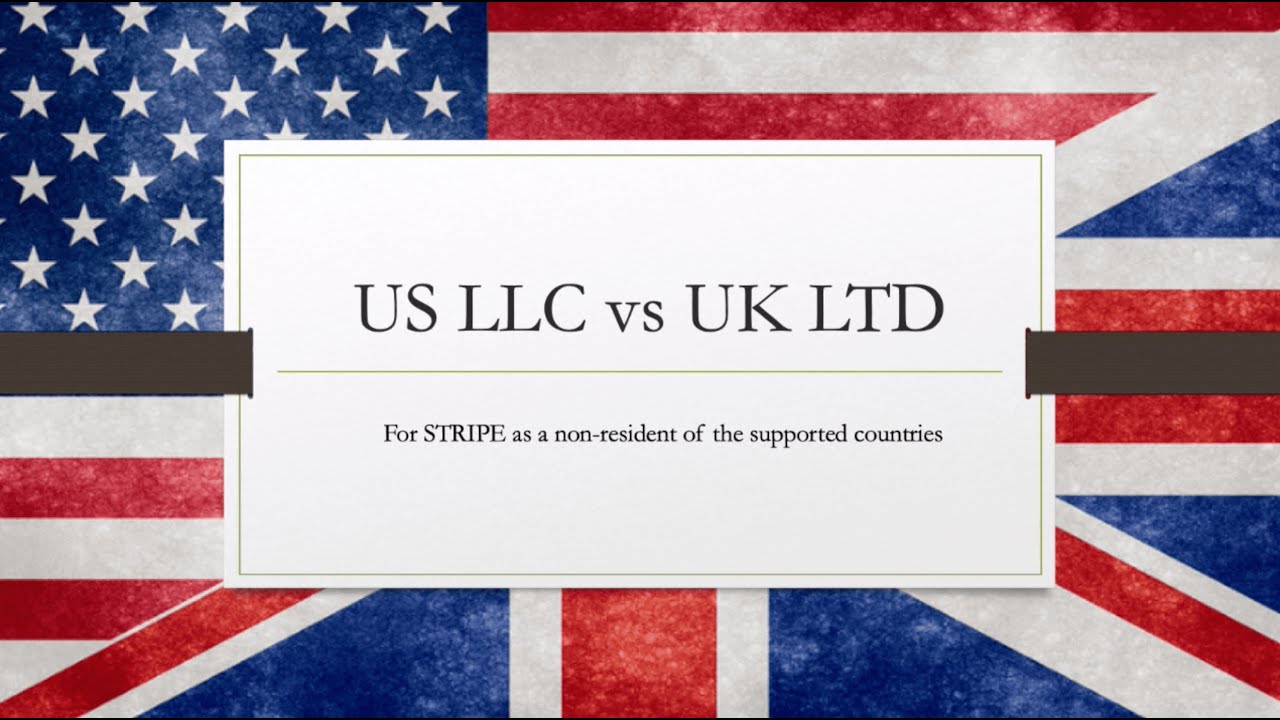LLC vs LTD: Understanding the Key Differences and Choosing the Right Structure
Choosing the right business structure is one of the most important decisions you’ll make as a business owner. The structure you choose will impact your legal liability, taxes, and even how your business is perceived by clients and investors. Two popular options are the Limited Liability Company (LLC) and the Limited (LTD) company. But what is the difference between LLC vs LTD, and how do you decide which one is right for your business?
In this comprehensive guide, we’ll explore the differences between LLC vs LTD, discussing their unique characteristics, benefits, and drawbacks. By the end of this article, you’ll have the knowledge needed to make an informed decision about which structure best suits your business needs.
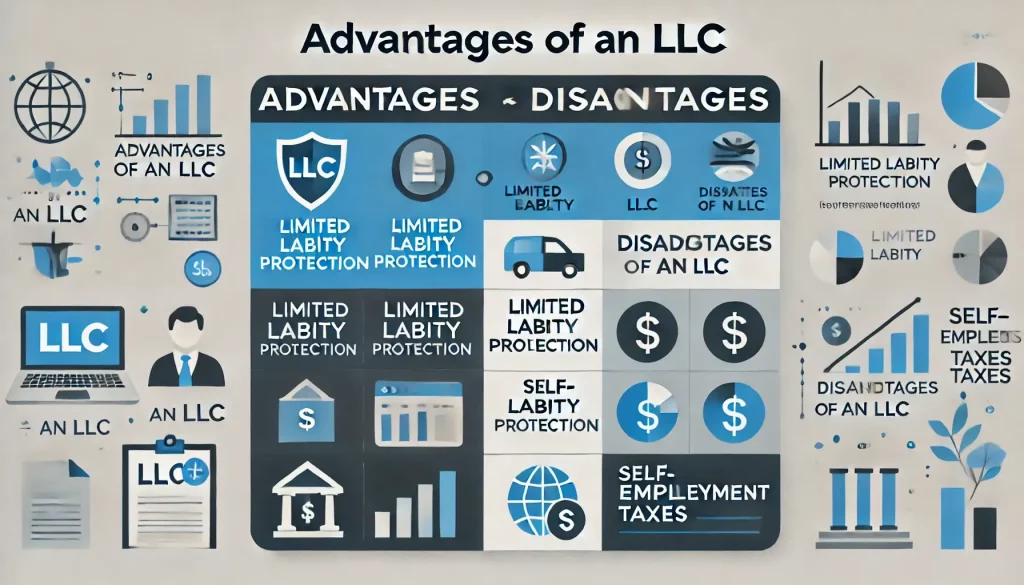
What is an LLC?
Definition and Overview of LLC
A Limited Liability Company (LLC) is a flexible business structure that combines elements of both partnerships and corporations. LLCs are known for offering limited liability protection to their owners, meaning that the personal assets of the members are generally protected from the company’s debts and liabilities.
LLCs are particularly favored by small and medium-sized businesses in the United States due to their ease of formation and fewer regulatory requirements compared to corporations. The structure allows for flexibility in management, where the owners, known as “members,” can directly manage the company or appoint managers to do so.
Key Characteristics of an LLC:
- Formation: Established by filing Articles of Organization with the state.
- Ownership: Can be owned by one or more individuals or entities, known as members.
- Management: Flexible management structure; can be member-managed or manager-managed.
- Liability Protection: Members are generally not personally liable for business debts.
Key Benefits of an LLC
There are several advantages to choosing an LLC as your business structure, which include:
- Limited Liability Protection: One of the primary benefits of an LLC is the limited liability protection it offers. This protection ensures that members’ personal assets, such as homes and savings, are not at risk if the business incurs debts or faces legal action.
- Pass-Through Taxation: LLCs enjoy a tax benefit known as “pass-through” taxation, where the company’s profits and losses are passed directly to the members and are reported on their individual tax returns. This avoids the double taxation faced by corporations, where profits are taxed at both the corporate and personal levels.
- Management Flexibility: LLCs offer significant flexibility in how they are managed. The members can choose to manage the company themselves or appoint managers. This flexibility allows the management structure to be tailored to the specific needs and expertise of the members.
- Minimal Compliance Requirements: Compared to corporations, LLCs have fewer ongoing compliance requirements, such as the need to hold annual meetings or keep detailed records, making them easier and less expensive to maintain.
- Customizable Profit Distribution: LLCs allow for more flexible profit distribution among members, which does not have to be proportional to ownership percentages. This can be particularly beneficial in situations where members contribute differently to the business.
Disadvantages of an LLC
Despite its many advantages, an LLC also has some drawbacks:
- Self-Employment Taxes: Members of an LLC are considered self-employed, meaning they are subject to self-employment taxes, which cover Social Security and Medicare. This can result in a higher tax burden compared to being an employee of a corporation.
- Limited Growth Potential: Raising capital can be more challenging for LLCs because they cannot issue stock, unlike corporations. This limitation can make it harder to attract investors who may prefer the structure and predictability of a corporation.
- State-Specific Regulations: LLC laws and regulations can vary significantly from state to state, which can complicate operations if the business operates in multiple states. Additionally, some states impose extra taxes or fees on LLCs.
- Complexity in Conversion: If a business starts as an LLC and later wants to convert to a corporation to attract investors or go public, the process can be complex and costly.
- Perceived Lack of Credibility: In some industries or regions, LLCs may be perceived as less credible or established compared to corporations, potentially impacting the business’s ability to attract certain clients, partners, or investors.
Table: Pros and Cons of an LLC
| Advantages | Disadvantages |
|---|---|
| Limited Liability Protection | Self-Employment Taxes |
| Pass-Through Taxation | Limited Growth Potential |
| Management Flexibility | State-Specific Regulations |
| Minimal Compliance Requirements | Complexity in Conversion |
| Customizable Profit Distribution | Perceived Lack of Credibility |
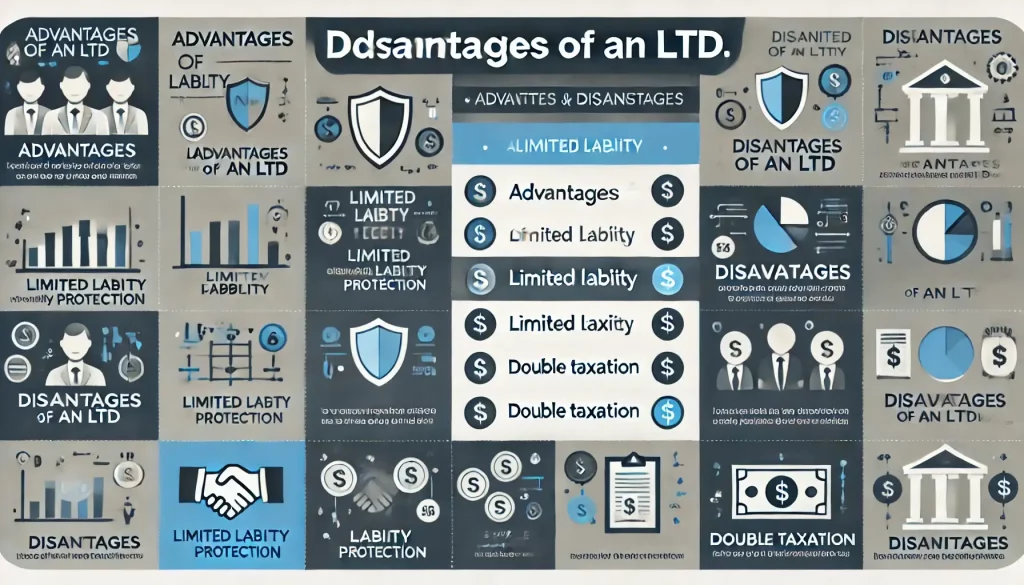
What is an LTD?
Definition and Overview of LTD
A Limited (LTD) company, often referred to simply as a “limited company,” is a type of business structure commonly used in the United Kingdom and other countries with similar legal systems. An LTD is a separate legal entity from its owners (known as shareholders), meaning that the company itself is responsible for its debts and obligations, not the individual shareholders.
In an LTD company, the liability of the shareholders is limited to the amount they have invested in the company, making it a popular choice for businesses that want to protect their owners from personal liability. This structure is similar to a corporation in the United States but with some key differences, particularly in terms of taxation and management.
Key Characteristics of an LTD:
- Formation: Established by filing Articles of Incorporation and creating a Memorandum of Association.
- Ownership: Owned by shareholders who hold shares in the company.
- Management: Managed by directors appointed by the shareholders.
- Liability Protection: Shareholders are only liable for the amount of capital they have invested in the company.
Key Benefits of an LTD
An LTD company offers several advantages, particularly in terms of liability protection and business credibility:
- Limited Liability Protection: Like an LLC, an LTD company offers limited liability protection to its shareholders. This means that if the company faces financial difficulties or legal action, the shareholders’ personal assets are protected. They are only liable up to the amount they have invested in the company.
- Separate Legal Entity: An LTD company is a separate legal entity, which means it can enter into contracts, own property, and be sued in its own name. This separation provides an additional layer of protection for shareholders and can help establish credibility and professionalism in the business world.
- Perceived Credibility and Trust: In many jurisdictions, LTD companies are perceived as more established and credible compared to other business structures. This perception can be important when dealing with clients, partners, and investors, particularly in industries where trust and professionalism are paramount.
- Easier Access to Capital: LTD companies can issue shares to raise capital, making it easier to attract investors. This can be particularly advantageous for businesses looking to expand or invest in new opportunities. Shareholders can also transfer or sell their shares, providing flexibility in ownership.
- Tax Planning Opportunities: LTD companies may have more options for tax planning compared to other business structures. For example, the company can retain profits within the business to be reinvested, potentially reducing the overall tax burden. Additionally, in some jurisdictions, LTDs may benefit from lower corporate tax rates.
Disadvantages of an LTD
While LTD companies offer several benefits, they also come with certain drawbacks that should be considered:
- More Formal Requirements: Establishing and maintaining an LTD company involves more formalities compared to other business structures like LLCs. This includes filing detailed annual reports, maintaining accurate financial records, and holding regular shareholder and director meetings. These requirements can add to the administrative burden of running the business.
- Double Taxation: In some cases, LTD companies may be subject to double taxation. This occurs when the company’s profits are taxed at the corporate level, and then the shareholders are taxed again when they receive dividends. However, tax laws vary by country, and there may be ways to mitigate this issue through careful tax planning.
- Complexity in Setup and Management: Setting up an LTD company can be more complex and time-consuming compared to other business structures. This complexity can include drafting detailed articles of incorporation, creating a memorandum of association, and navigating various legal requirements. Additionally, the ongoing management of the company can be more demanding due to the need to comply with regulatory requirements.
- Restrictions on Share Transfers: In some jurisdictions, LTD companies may face restrictions on the transfer of shares. This means that shareholders may need approval from other shareholders or directors before they can sell or transfer their shares. This can limit the flexibility of ownership and make it more difficult to bring in new investors.
- Potential for Reduced Control: In an LTD company, shareholders typically appoint directors to manage the company’s day-to-day operations. This can lead to a separation between ownership and control, where shareholders may have limited influence over the company’s decisions. This can be a disadvantage for owners who prefer to have direct control over their business.
Table: Pros and Cons of an LTD
| Advantages | Disadvantages |
|---|---|
| Limited Liability Protection | More Formal Requirements |
| Separate Legal Entity | Double Taxation |
| Perceived Credibility and Trust | Complexity in Setup and Management |
| Easier Access to Capital | Restrictions on Share Transfers |
| Tax Planning Opportunities | Potential for Reduced Control |
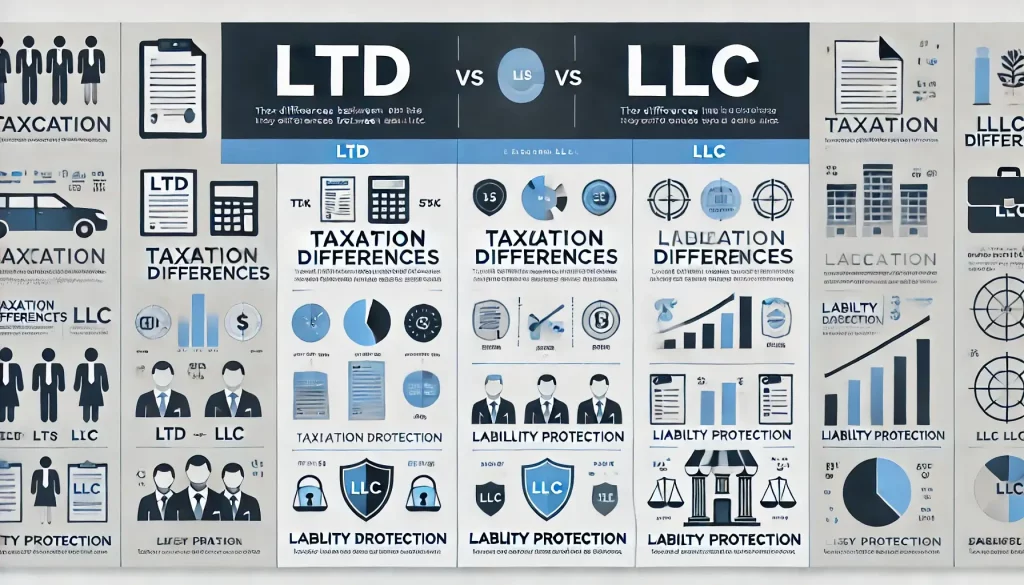
What is the Difference Between LTD and LLC?
Understanding the difference between LTD and LLC is crucial for anyone looking to establish a business, as each structure has distinct legal, tax, and management implications. Here, we’ll explore the key differences between these two business entities, focusing on aspects like legal structure, taxation, liability protection, management, and compliance requirements.
Legal Structure and Formation
LLC:
- An LLC (Limited Liability Company) is a flexible business structure that combines elements of both partnerships and corporations. It is typically easier to form than an LTD, with fewer formalities. An LLC is created by filing Articles of Organization with the state in which the business operates. The owners of an LLC are called “members,” and there is no limit on the number of members an LLC can have.
LTD:
- An LTD (Limited) company, on the other hand, is a more formal structure often used in the UK and other common law jurisdictions. It is a distinct legal entity from its owners, who are called shareholders. To form an LTD, one must file Articles of Incorporation and create a Memorandum of Association. The formation process tends to be more complex and involves more paperwork compared to an LLC.
Key Differences:
- Formality: LTD companies require more formalities during formation, including a Memorandum of Association and Articles of Incorporation, while LLCs are generally easier and quicker to establish.
- Ownership: LLCs can have an unlimited number of members, whereas LTDs are owned by shareholders who hold shares in the company.
- Legal Entity: Both LLCs and LTDs are separate legal entities, but the perception and legal nuances can differ depending on the jurisdiction.
Taxation Differences
LLC:
- One of the key advantages of an LLC is pass-through taxation. The profits and losses of the LLC pass through to the members, who report them on their personal tax returns. This structure avoids the double taxation that corporations might face, where income is taxed both at the corporate level and again at the personal level when dividends are paid out.
LTD:
- LTD companies, particularly in the UK, are subject to corporate tax. Profits are taxed at the corporate rate, and if profits are distributed to shareholders as dividends, those dividends may also be subject to taxation at the individual level, potentially leading to double taxation. However, the exact tax treatment can vary depending on the country’s tax laws and any available tax credits.
Key Differences:
- Tax Structure: LLCs generally benefit from pass-through taxation, which can reduce the overall tax burden. LTDs, however, face corporate taxation, and potentially double taxation if profits are distributed as dividends.
- Tax Planning: LTDs may offer more opportunities for tax planning, especially in countries where corporate tax rates are favorable, but they also require careful management to avoid double taxation.
Liability Protection
LLC:
- An LLC provides limited liability protection to its members. This means that the personal assets of the members are protected from the company’s debts and legal liabilities. In most cases, creditors cannot go after members’ personal assets to satisfy business debts, making it a popular choice for small businesses and startups.
LTD:
- Similar to an LLC, an LTD also offers limited liability protection. The shareholders’ liability is limited to the amount they have invested in the company. This means that if the company incurs debt or is sued, the personal assets of the shareholders are generally protected.
Key Differences:
- Both structures offer strong liability protection, but the specifics can vary depending on jurisdiction and the precise nature of the business. The choice between an LLC and an LTD may come down to other factors, such as taxation and management preferences.
Management Structure
LLC:
- LLCs offer significant flexibility in management. They can be either member-managed, where all members participate in running the business, or manager-managed, where the members appoint one or more managers to handle day-to-day operations. This flexibility allows businesses to tailor their management structure to their specific needs.
LTD:
- LTD companies typically have a more rigid management structure. The shareholders elect directors who are responsible for managing the company. The directors may appoint officers to handle daily operations, but the overall management must comply with more formal procedures, including board meetings and resolutions.
Key Differences:
- Flexibility: LLCs offer more flexibility in how the business is managed, while LTDs follow a more traditional corporate structure with defined roles for directors and officers.
- Decision-Making: In an LLC, decision-making can be more straightforward and flexible, whereas LTDs require more formalities, such as board approvals and shareholder votes.
Compliance and Regulatory Requirements
LLC:
- LLCs have relatively few ongoing compliance requirements. In many jurisdictions, they do not need to hold annual meetings or keep extensive records. However, they are still required to file annual reports and pay any applicable fees to maintain their good standing with the state.
LTD:
- LTDs are subject to more stringent compliance and regulatory requirements. These include filing detailed annual returns, maintaining up-to-date records, holding annual general meetings (AGMs), and adhering to stricter accounting and reporting standards. This can increase the administrative burden on the business.
Key Differences:
- Compliance Burden: LTDs typically face more regulatory and compliance requirements than LLCs, which can increase operational costs and complexity.
- Reporting Requirements: LTDs must adhere to stricter reporting and governance standards, whereas LLCs enjoy more operational freedom with fewer formalities.
Table: Comparison Between LTD and LLC
| Aspect | LTD | LLC |
|---|---|---|
| Legal Structure | Formal with complex setup | Flexible and easier to set up |
| Taxation | Corporate tax, potential double taxation | Pass-through taxation |
| Liability Protection | Limited to shareholders’ investment | Limited to members’ investment |
| Management Structure | Directors and officers manage | Flexible management (member or manager) |
| Compliance Requirements | Strict, with annual returns and AGMs | Less strict, with minimal formalities |
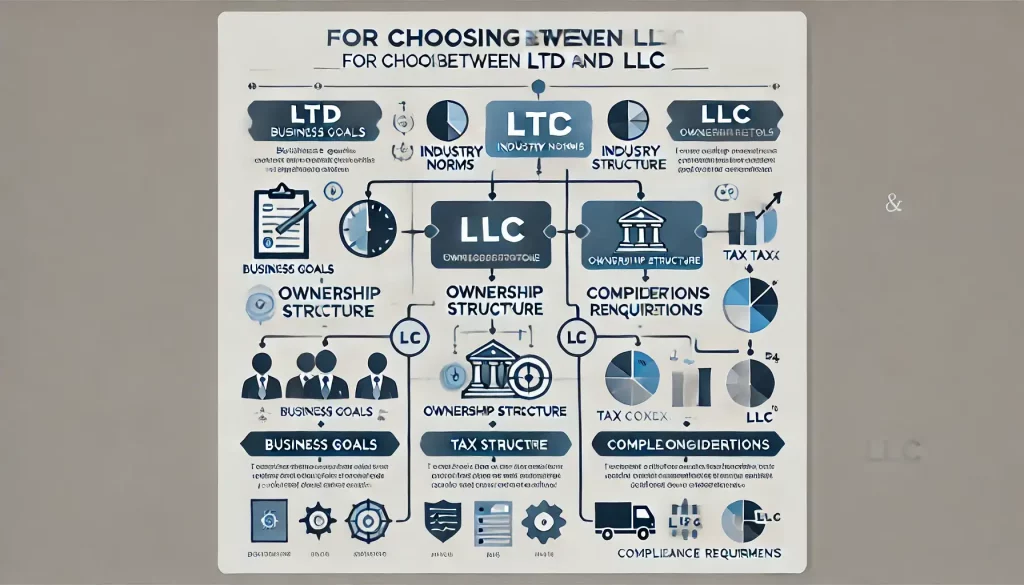
Which is Right for Your Business: LTD or LLC?
Choosing between an LTD and an LLC is a critical decision that depends on various factors, including your business goals, industry, and long-term plans. In this section, we will explore the key considerations that can help you determine which structure is the best fit for your business. We’ll also look at real-world examples and provide expert recommendations to guide your decision.
Factors to Consider
- Business Goals
- Short-Term vs. Long-Term Goals: If your primary goal is to get your business up and running quickly with minimal administrative burden, an LLC might be the better choice due to its flexibility and ease of formation. However, if you plan to grow your business significantly, attract investors, or even go public, an LTD might be more suitable due to its formal structure and ability to issue shares.
- Exit Strategy: Consider your exit strategy. If you anticipate selling your business or bringing on investors in the future, an LTD may be more appealing to potential buyers or investors, who often prefer the clear ownership structure and governance standards of an LTD.
- Industry Norms
- Industry Practices: Certain industries have preferred business structures. For example, professional services like law and accounting often opt for LLCs due to their flexibility. Conversely, tech startups and companies aiming for rapid growth may prefer an LTD structure, which is more conducive to raising capital through equity financing.
- Regulatory Environment: Depending on the industry, regulatory requirements may make one structure more favorable than the other. For example, certain sectors may have specific legal requirements that align better with the structure of an LTD.
- Ownership Structure
- Number of Owners: LLCs are ideal for businesses with a smaller number of owners who want to be directly involved in the day-to-day management of the company. LTDs, however, are better suited for businesses with multiple shareholders who may not be involved in daily operations.
- Flexibility in Ownership: LLCs allow for more flexible ownership structures, including varying levels of involvement and profit distribution among members. LTDs, on the other hand, have a more rigid ownership structure, with ownership represented by shares.
- Tax Considerations
- Tax Burden: If minimizing the tax burden is a priority, the pass-through taxation of an LLC might be advantageous, especially for small businesses or startups. However, if the business is expected to retain earnings or reinvest profits, the corporate tax structure of an LTD might offer more opportunities for tax planning.
- Local Tax Laws: Taxation laws vary significantly by jurisdiction, so it’s important to consider local tax implications when choosing between an LTD and an LLC. Consulting with a tax professional can provide clarity on which structure offers the most favorable tax treatment for your specific situation.
- Compliance and Administrative Requirements
- Ease of Administration: LLCs typically have fewer administrative requirements, making them easier to manage, especially for small businesses. If your business operates in multiple states or countries, the simpler compliance requirements of an LLC can reduce administrative overhead.
- Formalities and Record-Keeping: LTDs require more formalities, such as annual general meetings, detailed record-keeping, and compliance with stricter reporting standards. While this can add to the administrative burden, it may also provide more structure and clarity, which can be beneficial as the business grows.
Case Studies
Case Study 1: A Small Consulting Firm
- Background: A small consulting firm with three partners decides to form an LLC. The partners prefer direct management and want to minimize administrative overhead. The LLC structure provides the flexibility they need to manage the business without the complexities of a formal corporate structure.
- Outcome: The LLC allows the partners to focus on growing their business, with profits passed directly to their personal tax returns. They enjoy the protection of limited liability while avoiding the double taxation of a corporation.
Case Study 2: A Tech Startup
- Background: A tech startup aims to raise venture capital and eventually go public. The founders opt to form an LTD, recognizing that investors prefer the clarity and formal structure of an LTD, including the ability to issue shares.
- Outcome: The LTD structure enables the startup to attract investors and issue equity as the company grows. The formal governance structure of the LTD provides transparency and trust, essential for attracting significant investment.
Expert Recommendations
- For Small Businesses and Startups: Experts often recommend starting with an LLC due to its flexibility, ease of formation, and favorable tax treatment. An LLC is particularly suitable for businesses with a small number of owners who are directly involved in the management of the company.
- For Growing Businesses: If your business is poised for growth, especially if you plan to attract investors or go public, forming an LTD may be the better option. The LTD structure is designed to support more complex ownership arrangements and can provide the framework needed for raising capital and expanding operations.
- Consultation with Professionals: Before making a final decision, it’s advisable to consult with legal and tax professionals who can provide personalized advice based on your specific business goals, industry, and jurisdiction. They can help you understand the implications of each structure and guide you toward the best choice for your business.
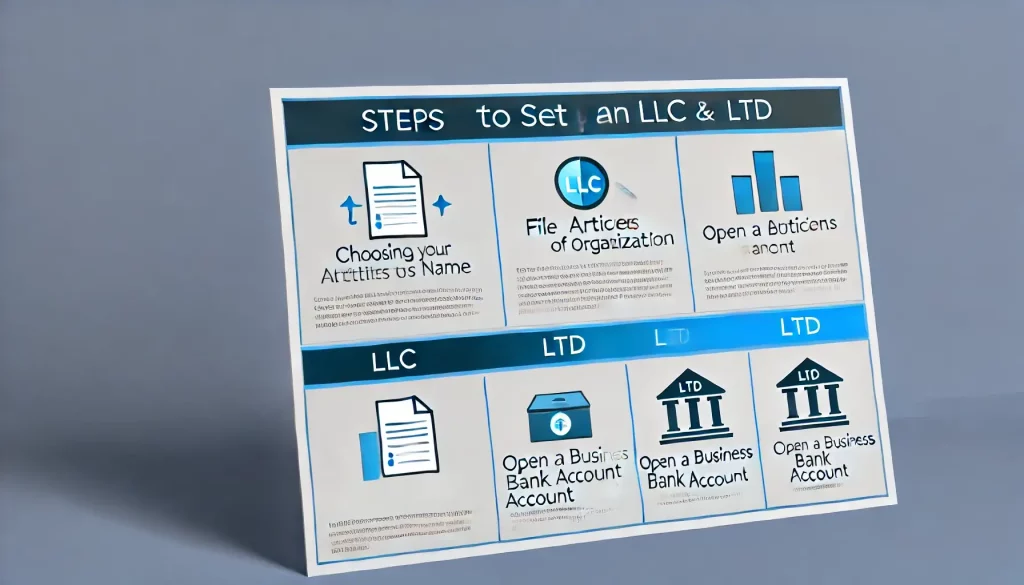
How to Set Up an LLC or LTD
Setting up an LLC or LTD involves several important steps, and while the process may vary depending on your location and specific business needs, the following guide provides a comprehensive overview of what you can expect when forming either type of business structure.
Step-by-Step Guide to Forming an LLC
Forming a Limited Liability Company (LLC) is generally straightforward and involves the following key steps:
- Choose a Business Name
- Check Availability: Ensure that your desired business name is unique and not already in use by another company in your state. Most states have an online database where you can check name availability.
- Compliance: The name must include the words “Limited Liability Company” or the abbreviation “LLC.” Some states may have additional requirements regarding the name.
- File Articles of Organization
- Prepare the Articles: This document outlines basic information about your LLC, including the business name, address, and the names of the members. It may also include the purpose of the LLC.
- Submit to the State: File the Articles of Organization with your state’s business filing office, usually the Secretary of State. A filing fee is typically required, which can range from $50 to $500 depending on the state.
- Create an Operating Agreement
- Internal Document: Although not always required by law, an Operating Agreement is a critical document that outlines the management structure, roles of members, and how profits and losses will be distributed.
- Flexibility: The Operating Agreement can be customized to suit the needs of the LLC members, offering flexibility in how the business is managed and operated.
- Obtain an EIN (Employer Identification Number)
- Tax Identification: Apply for an Employer Identification Number (EIN) from the IRS. This number is necessary for tax purposes, opening a business bank account, and hiring employees.
- Online Application: The process is simple and can be completed online through the IRS website.
- Register for State Taxes and Licenses
- State Requirements: Depending on your state, you may need to register for state-specific taxes, such as sales tax or franchise tax. Additionally, check if your business needs any specific licenses or permits to operate legally.
- Compliance: Ensure you comply with all local, state, and federal regulations to avoid penalties or legal issues.
- Open a Business Bank Account
- Separate Finances: Open a dedicated business bank account to keep your personal and business finances separate. This is crucial for maintaining limited liability protection.
- Choose the Right Account: Consider your banking needs, such as transaction limits and online banking services, when choosing a business bank account.
- Comply with Ongoing Requirements
- Annual Reports: Most states require LLCs to file an annual report and pay a corresponding fee. The report typically includes basic information about the LLC and its members.
- Taxes and Renewals: Stay on top of state and federal tax filings, and renew any required licenses or permits as needed.
Table: Overview of LLC Formation Steps and Costs
| Step | Description | Estimated Cost |
|---|---|---|
| Choose a Business Name | Ensure name availability and compliance | Free to $50 |
| File Articles of Organization | Submit required documents to the state | $50 to $500 |
| Create an Operating Agreement | Internal document for LLC management | $0 to $200 (if using a lawyer) |
| Obtain an EIN | Apply for Employer Identification Number | Free |
| Register for State Taxes | Register for state-specific taxes | Varies by state |
| Open a Business Bank Account | Open a dedicated account for the LLC | Varies by bank |
| Comply with Ongoing Requirements | Annual reports, tax filings, renewals | $50 to $500 annually |
Step-by-Step Guide to Forming an LTD
Forming a Limited (LTD) company is a more formal process compared to an LLC, and involves the following steps:
- Choose a Business Name
- Check Availability: Ensure the business name is unique and compliant with local laws. In the UK, the name must not be too similar to an existing company or contain sensitive words unless approved.
- Inclusion of ‘Limited’: The name must include “Limited” or “Ltd” at the end, signifying that the company is a limited liability entity.
- Draft and File the Articles of Incorporation
- Memorandum of Association: This document outlines the intent to form the company and is signed by the initial shareholders (subscribers).
- Articles of Association: These set out the rules for running the company, including the rights of shareholders, the responsibilities of directors, and the process for issuing shares.
- Submit to the Registrar: In the UK, you would file these documents with Companies House. In other jurisdictions, the relevant corporate registry may differ. A filing fee is required, usually ranging from £10 to £100.
- Appoint Directors and Shareholders
- Minimum Requirements: An LTD must have at least one director. Directors are responsible for managing the company and complying with legal obligations.
- Issue Shares: Determine the share structure of the company, including the number of shares and their value. Shares represent ownership in the company and can be issued to the initial shareholders.
- Obtain a Corporate Tax Identification Number
- HMRC Registration: In the UK, after incorporation, the company must register with HMRC (Her Majesty’s Revenue and Customs) for corporate tax purposes. This includes obtaining a corporate tax identification number and setting up online accounts for tax filings.
- VAT Registration: If your business’s taxable turnover exceeds the VAT threshold, you must also register for VAT.
- Open a Business Bank Account
- Corporate Account: Open a corporate bank account to manage the company’s finances. Having a separate account is crucial for maintaining limited liability protection.
- Consider Business Needs: Choose a bank that offers services suited to your company’s size and business activities, such as international transactions or loan facilities.
- Register for PAYE (Pay As You Earn)
- Employee Payroll: If the company plans to hire employees, it must register for PAYE with HMRC. This system is used to collect income tax and national insurance from employees’ wages.
- Pension Contributions: You may also need to set up a pension scheme for employees, as required by law in many jurisdictions.
- Comply with Ongoing Requirements
- Annual Filings: LTD companies are required to file an annual confirmation statement and financial accounts with Companies House.
- Corporate Taxes: File annual corporate tax returns and pay any due taxes to HMRC. Failure to comply with these requirements can result in penalties.
Table: Overview of LTD Formation Steps and Costs
| Step | Description | Estimated Cost |
|---|---|---|
| Choose a Business Name | Ensure name availability and compliance | Free to £50 |
| File Articles of Incorporation | Submit documents to the Registrar | £10 to £100 |
| Appoint Directors and Shareholders | Establish management and ownership | Free |
| Obtain Corporate Tax ID | Register with HMRC for taxes | Free |
| Open a Business Bank Account | Corporate account for finances | Varies by bank |
| Register for PAYE | Payroll registration for employees | Free |
| Comply with Ongoing Requirements | Annual reports, tax filings, renewals | £13 to £1,500 annually |
Conclusion
Choosing between an LLC (Limited Liability Company) and an LTD (Limited) company is a crucial decision that can significantly impact your business’s success, legal standing, and financial outcomes. Each structure offers distinct advantages and drawbacks, and the right choice depends on your specific business needs, goals, and the legal environment in which you operate.
Key FAQs Summary
| Question | LLC | LTD |
|---|---|---|
| Is it the same as a Limited Company? | No, it’s a different structure with its own rules. | No, it’s distinct from an LLC with different regulations. |
| Can you convert between structures? | Yes, but it’s complex. | Yes, but it’s complex. |
| Tax benefits? | Pass-through taxation, avoiding double taxation. | Corporate tax, potential for double taxation. |
| Best for international operations? | Suitable for domestic, but less recognized abroad. | Preferred for international operations. |
| Preferred by investors? | Less preferred due to flexibility and informality. | More preferred due to share issuance and structure. |
| Ownership structure? | Flexible, based on membership interests. | Rigid, based on shareholding. |
FAQs
Is an LLC the Same as a Limited Company?
No, an LLC (Limited Liability Company) is not the same as a Limited Company (LTD). Although both structures provide limited liability protection to their owners, they differ in terms of legal requirements, management, and taxation. LLCs are commonly used in the United States and offer a more flexible management structure with pass-through taxation. LTDs, often found in the UK and other common law countries, are more formal with stricter regulatory requirements and may face double taxation.
Can You Convert an LLC to an LTD or Vice Versa?
Yes, it is possible to convert an LLC to an LTD or vice versa, but the process can be complex. The conversion typically involves dissolving the original entity and forming a new one under the desired structure. This may require legal filings, changes to the business’s operating agreements, and possible tax implications. Consulting with a legal professional is recommended to ensure the conversion is done correctly and in compliance with relevant laws.
What Are the Tax Benefits of an LLC vs LTD?
LLC:
LLCs benefit from pass-through taxation, meaning the business itself is not taxed. Instead, profits and losses are reported on the individual tax returns of the members, avoiding double taxation. This structure is particularly advantageous for small businesses and startups looking to minimize their tax burden.
LTD:
LTDs are subject to corporate tax, and any profits distributed as dividends to shareholders may be taxed again at the individual level. However, LTDs may offer more opportunities for tax planning, especially in jurisdictions with favorable corporate tax rates. Businesses with plans for significant reinvestment may find the LTD structure beneficial for managing their tax obligations.
Which Business Structure is Best for International Operations?
The choice between LLC and LTD for international operations depends on various factors:
LTD: LTD companies are often preferred for international operations due to their formal structure, perceived credibility, and the ability to raise capital through issuing shares. They may also be better recognized in international markets, making it easier to establish partnerships and contracts across borders.
LLC: While LLCs are more flexible and easier to manage, they may not be as well understood or accepted in international markets. However, they can still be a good choice for businesses that primarily operate domestically or that do not require complex international arrangements.
Do Investors Prefer LLC or LTD?
Investors typically prefer LTD companies over LLCs for several reasons:
Equity Issuance: LTDs can issue shares of stock, which is a common way for investors to gain ownership in a company. This makes it easier to attract investment capital.
Corporate Structure: The formal governance structure of an LTD, including the roles of directors and shareholders, provides transparency and predictability, which are attractive to investors.
Exit Strategy: Investors often look for clear exit strategies, such as a public offering or a sale of the company. The LTD structure is more conducive to these scenarios.
How Does the Ownership Structure Differ Between LLC and LTD?
LLC: Ownership in an LLC is represented by membership interests, which can be divided among the members according to the operating agreement. There is flexibility in how profits and losses are distributed, regardless of ownership percentages.
LTD: Ownership in an LTD is represented by shares, which are issued to shareholders. The ownership structure is more rigid, with profits typically distributed based on the number of shares held. Shareholders have voting rights that influence major decisions within the company.

